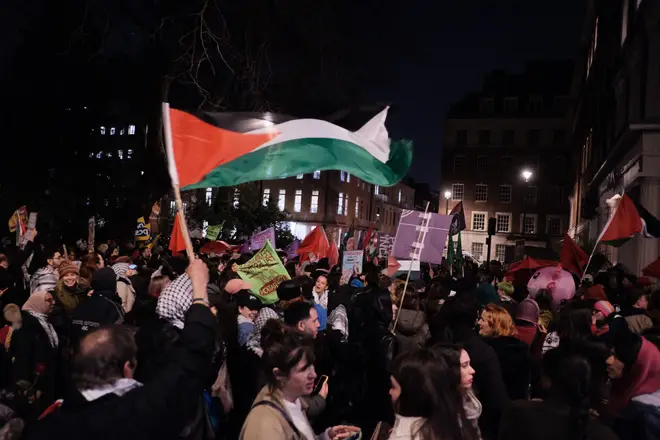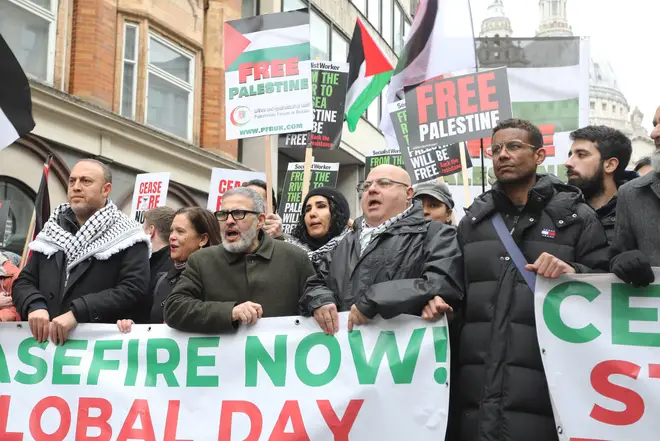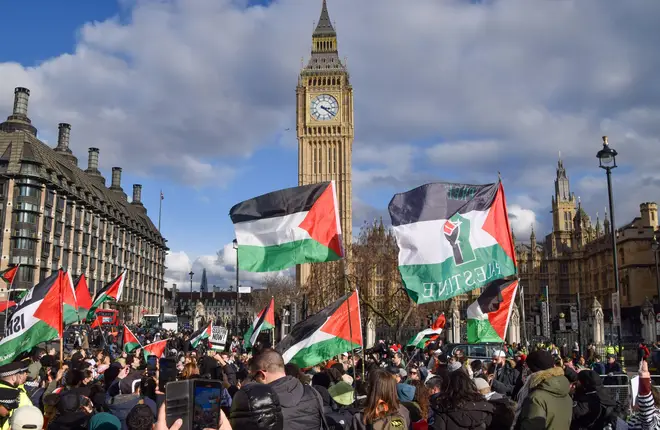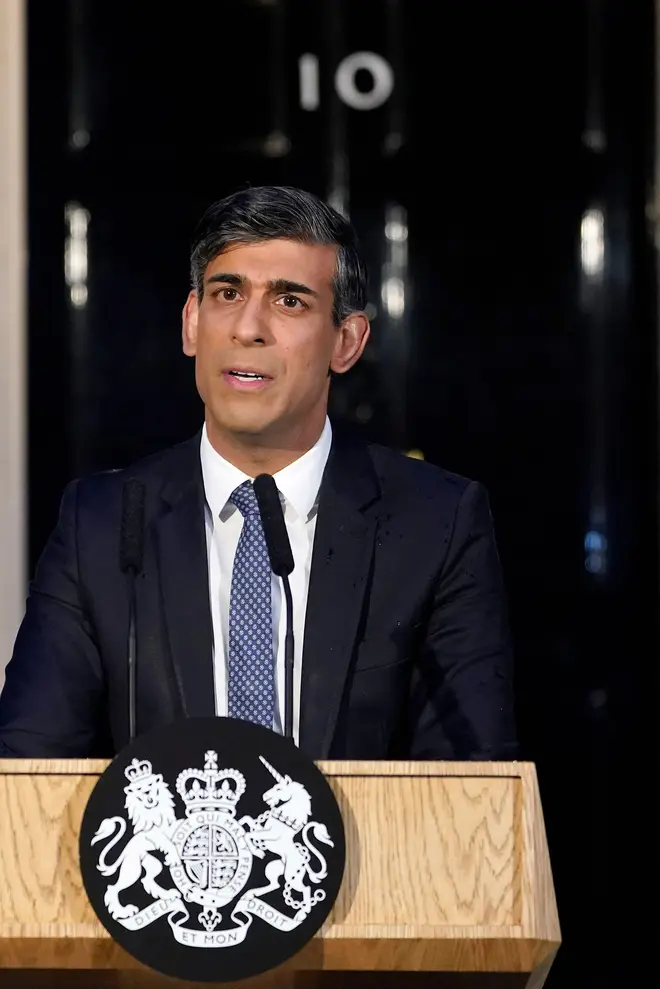
Clive Bull 1am - 4am
8 March 2024, 22:24

Jewish leaders have rejected claims that London is becoming a "no-go zone" for Jewish people on the weekend, although some noted that the marches made them feel unsafe.
Robin Simcox, the government's extremism adviser, said that some radical groups have gone unchallenged for too long in the UK.
He made the warning less than a week after Rishi Sunak claimed that Palestine marchers had extremists in their ranks.
March organisers have said that their events are peaceful, and denied that slogans like 'From the river to the sea' are anti-Semitic. Dozens of people have been arrested for their activities on marches, including some for overt support of Hamas. Others have called for 'jihad'.
But some rabbis, and leading figures in London's Jewish community said that the characterisation was not true.
Read more: Half of British Jews 'considering leaving the UK' amid 'staggering' rise in anti-Semitism

Rabbi Herschel Gluck, president of the Shomrim neighbourhood watch group in London, said he was disturbed by Mr Simcox's suggestion. "It’s like saying the Earth is flat," he told the Times.
"It has nothing to do with reality. To say there are no-go zones in London for Jews is a total and utter fiction.”
Rabbi Laura Janner-Klausner, from the Reform Judaism movement, said the marches were "definitely intimidating for many Jews, although I do not think that that is the intention of most people who are on these marches because they really care about justice for Palestinians as opposed to dislike or hatred of Jews."
Daniel Sugarman, the director of public affairs at the Board of Deputies of British Jews, said: "I don’t feel particularly comfortable with the language of ‘no-go zones’.
“Many British Jews feel extremely disturbed" by the marches, he said.

The government is drawing up new definition of extremism that will allow the government, universities, and local authorities to ban funding for and engagement with Islamist and far-right groups. It is set to be unveiled next week.
Writing in the Telegraph, Mr Simcox wrote: "We have not betrayed democracy if extremists are no longer able to operate television channels,” he said.
“And we will not have become an authoritarian state if London is no longer permitted to be turned into a no-go zone for Jews every weekend.
“All these things and more have become normalised in the UK. It is why I have warned of a permissive environment for radicalisation developing that needs urgently addressing.
"These groups have gone unchallenged for too long, and have used their time well. They are now embedded and influential among communities."

Caller insists you can't critique Israel without being labelled as 'anti-Semitic or an Islamist'
Mr Simcox is said to want tougher restrictions on protests, and has sought views on whether protests could be held in other parts of London, or could be static.
He said in his article that regulatory bodies like Ofcom and the Charity Commission could be tougher on extremist groups running organisations in the UK.
Mr Simcox also said that the government should be willing to accept a higher legal risk to tackle extremists.
"This is particularly pertinent when it comes to disrupting the activities of those groups who propagate extremist narratives but who lurk just below the terrorism threshold," he wrote.

It comes after Mr Sunak said last Friday that Britain had seen a "shocking increase in extremist disruption and criminality" in recent weeks and months.
His comments came ahead of pro-Palestine protests which are set to continue across the country on Saturday.
Several MPs have said they have felt threatened by protesters, and Parliament descended into chaos after Commons Speaker Sir Lindsay Hoyle said he broke with convention because of security fears.
Earlier this week the Home Secretary announced a £31m package to boost security measures for MPs.
"What started as protests on our street has descended into intimidation, threats and planned acts of violence," he said.
"Jewish children fearful to wear their school uniform lest it reveal their identity.
"Muslim women abused in the street for the actions of a terrorist group they have no connection with. Now our democracy itself is a target, saying that MPs don't feel safe at home.

New Rochdale MP George Galloway on what he would say to Keir Starmer 'in the toilets of Parliament'
Mr Sunak also addressed the election of George Galloway, saying it demands a response.
The Prime Minister said that "it was beyond alarming that last night the Rochdale by-election returned a candidate who dismisses the horror of what happened on 7 October".
Mr Galloway said in response: "I abhor extremism just as much as he does (Mr Sunak) and that’s why I’m wearing a hat, because I was savagely assaulted whilst an MP in 2014, in a politically motivated assault, which hospitalised me and saw the assailant jailed for 20 months. So I’m as much against extremism and violence as anyone else and probably a little more so given my, my personal experience."
He added: "I also agreed with him when he said that change can only come through the democratic process. I’ve just spent four weeks on the streets of Rochdale, in the democratic process. The returning officer, a man of unimpeachable integrity one assumes, declared it last night, as a free and fair election."

Sangita Myska asks: 'Do you feel deserted by the two main parties?'
Mr Sunak said: "Our streets have been hijacked by small groups who are hostile to our values," Mr Sunak said.
"Threats of violence and intimidation are alien to our way of doing things," he went on.
Islamist extremists and far-right are two sides of the same coin, he said, noting that neither respect democracy. They are "spreading a poison," he said.
But he said that Islam is "emphatically not the same thing" as Islamism.
He said that extremism "aims to drain us of our confidence in ourselves as a people and in our shared future".
"They want to destroy confidence and hope. We must not allow that to happen."
He added: "No country is perfect, but I am enormously proud of the good that our country has done".
Mr Sunak added: "We must be prepared to stand up for our shared values in all circumstances, no matter how difficult" in the face of divisions.
"The time has now come for us all to stand together to combat the forces of division and beat this poison.
"We must face down the extremists who would tear us apart."If we do that, we can build on our great achievement in creating today's Britain, a country of kind decent, tolerant people.
The Prime Minister said: "We can make this a country in which we all feel a renewed sense of pride. This is our home.
"So let us go forward together, confident in our values and confident in our future."
It comes amid growing fears about the safety of MPs in recent months, particularly over concerns they could be targeted by extremists.
Conservative backbencher Tobias Ellwood's home was targeted earlier this month by pro-Palestine protesters, with the police warning his family to "stay away" from the property as "arriving through that crowd would've antagonised the situation".
Two serving MPs - Labour's Jo Cox and Conservative Sir David Amess - have been murdered in the past eight years, with reforms to the security of parliamentarians having been introduced as a result of those killings.